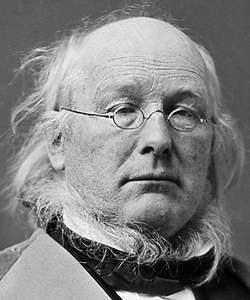Horace Greeley (American National Biography)
Under Greeley's guidance, the Tribune became one of the great American newspapers. By 1860 the Tribune in all its formats--daily, weekly, semiweekly--would reach a circulation of nearly 300,000. Renowned as a "political Bible" and distinguished for its excellent reporting of local, national, and global events, the Tribune in the 1840s, 1850s, and 1860s featured a galaxy of brilliant writers, among them, Solon Robinson on agriculture; Bayard Taylor on travel; Charles Dana, the managing editor; George Ripley and Margaret Fuller, the latter a close friend, on literary topics; and James Pike on Washington affairs. Perhaps the most intriguing Greeley reporter was Karl Marx, who wrote about European affairs in the 1850s. Greeley believed that while his editorials represented his personal perspective, a newspaper should be an open forum for the competing and colliding views of talented spirits. In this way, he sponsored an intellectual democracy.



















